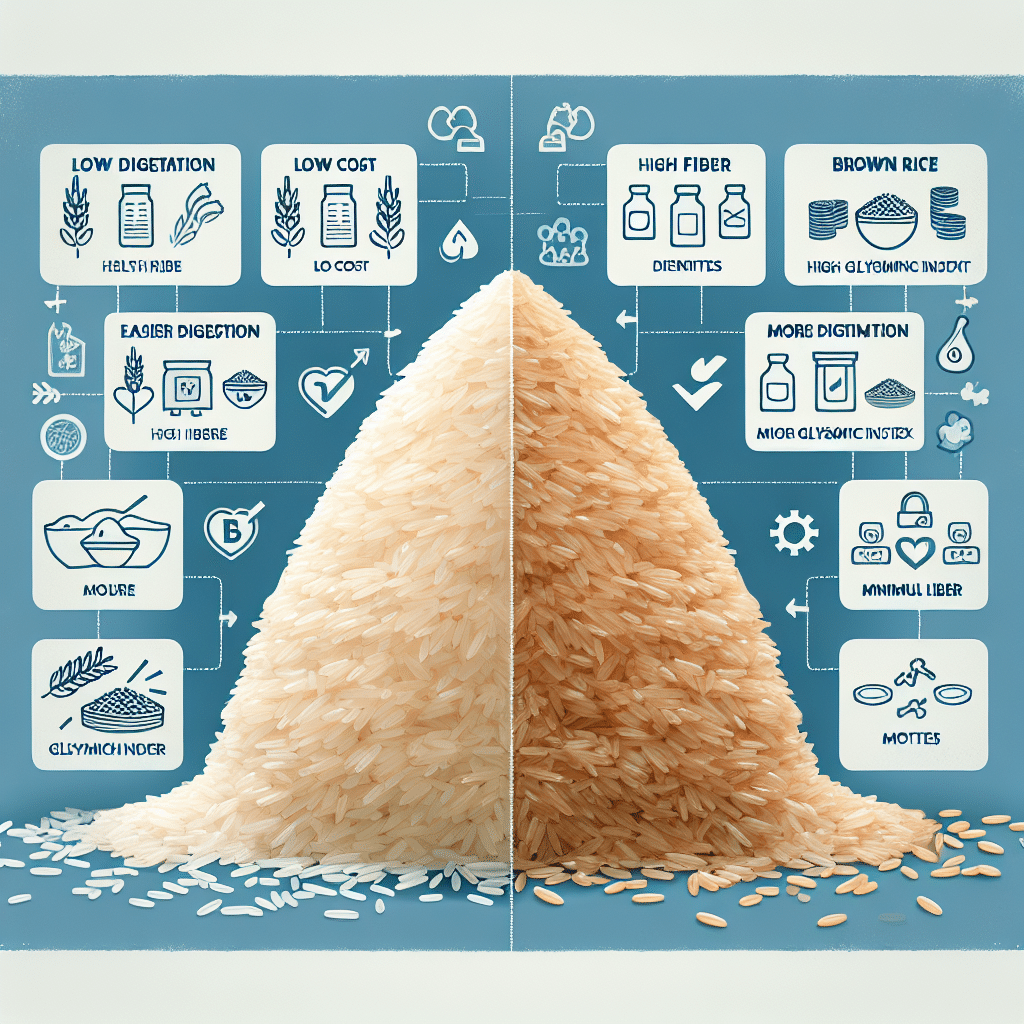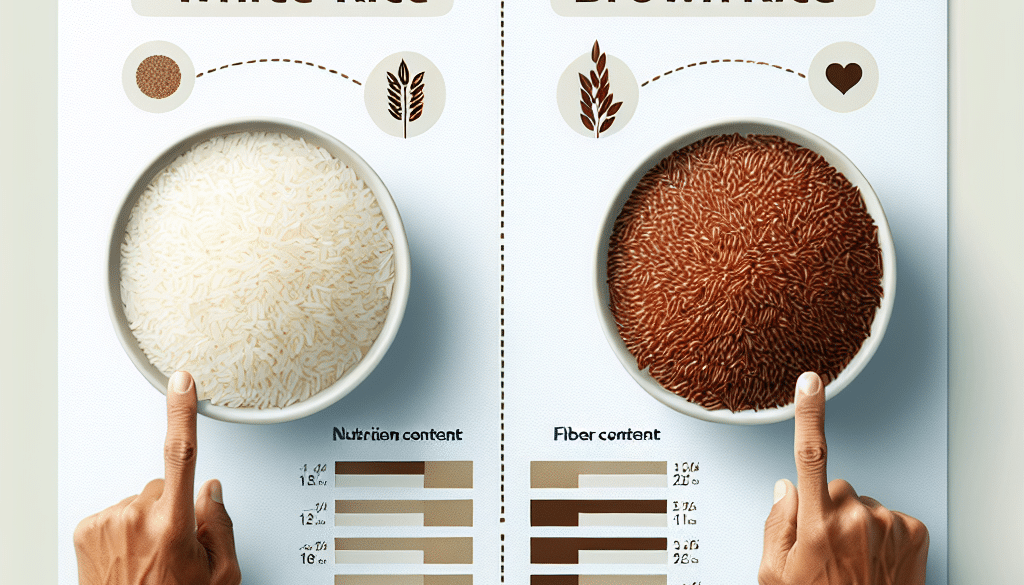Which Is Healthier White Or Brown Rice?
-
Table of Contents
- White vs. Brown Rice: Unveiling the Healthier Choice
- Nutritional Comparison of White and Brown Rice
- Health Benefits of Brown Rice
- Considerations for White Rice
- Potential Drawbacks
- Case Studies and Statistics
- Conclusion: Making the Healthier Choice
- Enhance Your Diet with ETprotein’s High-Quality Protein Products
White vs. Brown Rice: Unveiling the Healthier Choice

When it comes to choosing between white and brown rice, health-conscious individuals often find themselves at a crossroads. The debate over which type of rice is healthier has been ongoing for years, with each variety having its own set of advocates. In this article, we will delve into the nutritional profiles, health benefits, and potential drawbacks of both white and brown rice to determine which is the superior choice for a healthy diet.
Nutritional Comparison of White and Brown Rice
Understanding the nutritional differences between white and brown rice is crucial in making an informed decision about which is healthier. Here’s a breakdown of their key nutritional components:
- Fiber: Brown rice is a whole grain and naturally high in fiber, which aids in digestion and can help in managing weight and blood sugar levels.
- Vitamins and Minerals: Brown rice retains its bran and germ, which are rich in vitamins and minerals such as magnesium, phosphorus, and B vitamins. White rice, on the other hand, is often enriched with iron and some B vitamins to compensate for the loss during processing.
- Antioxidants: The bran layer of brown rice contains antioxidants that are not present in white rice.
- Protein: Both types of rice contain similar amounts of protein, but the quality of protein in brown rice is slightly higher due to the presence of more essential amino acids.
- Glycemic Index: Brown rice has a lower glycemic index compared to white rice, meaning it causes a slower rise in blood sugar levels.
Health Benefits of Brown Rice
Brown rice is often touted as the healthier option for several reasons:
- Weight Management: The high fiber content in brown rice helps in feeling full longer, which can prevent overeating and contribute to weight loss.
- Heart Health: Studies have shown that consuming whole grains like brown rice can reduce the risk of heart disease due to their ability to lower cholesterol levels.
- Blood Sugar Control: The lower glycemic index of brown rice makes it a better choice for individuals with diabetes or those trying to manage their blood sugar levels.
- Digestive Health: Fiber is essential for a healthy digestive system, and brown rice is an excellent source of this nutrient.
Considerations for White Rice
While white rice is often viewed as the less healthy option, it does have certain advantages:
- Digestibility: Some people find white rice easier to digest, especially those with sensitive stomachs or digestive issues.
- Enrichment: In many countries, white rice is enriched with essential nutrients to help prevent deficiencies.
- Culinary Uses: White rice has a neutral flavor and a softer texture, making it a versatile ingredient in a wide range of dishes.
Potential Drawbacks
Both white and brown rice have potential drawbacks that should be considered:
- Arsenic Levels: Brown rice can contain higher levels of arsenic compared to white rice due to its retention of the outer bran layer where arsenic accumulates.
- Phytic Acid: Brown rice contains phytic acid, which can bind to minerals and reduce their absorption.
- Processing: White rice undergoes more processing, which strips away many of its natural nutrients.
Case Studies and Statistics
Several studies have compared the health effects of white and brown rice. For instance, a study published in the American Journal of Clinical Nutrition found that replacing white rice with brown rice was associated with a lower risk of type 2 diabetes. Additionally, the Harvard School of Public Health reported that individuals who consume two or more servings of brown rice per week have a lower risk of developing diabetes than those who consume white rice regularly.
Conclusion: Making the Healthier Choice
In conclusion, while both white and brown rice can be part of a balanced diet, brown rice has a nutritional edge due to its higher fiber content, richer vitamin and mineral profile, and lower glycemic index. However, individuals should consider their own digestive health, potential arsenic exposure, and culinary preferences when choosing between the two. Moderation and variety are key components of a healthy diet, so incorporating both types of rice along with other whole grains can provide a wide range of nutrients and health benefits.
Enhance Your Diet with ETprotein’s High-Quality Protein Products
If you’re looking to complement your healthy diet with additional protein sources, consider ETprotein’s range of organic and vegan protein products. Their offerings, such as Organic rice protein and clear rice protein, provide a neutral taste and are non-GMO and allergen-free. These high-quality proteins are perfect for those seeking to maintain a balanced diet while ensuring adequate protein intake.
About ETprotein:
ETprotein, a reputable protein and L-(+)-Ergothioneine (EGT) Chinese factory manufacturer and supplier, is renowned for producing, stocking, exporting, and delivering the highest quality organic bulk vegan proteins and L-(+)-Ergothioneine. They include Organic rice protein, clear rice protein, pea protein, clear pea protein, watermelon seed protein, pumpkin seed protein, sunflower seed protein, mung bean protein, peanut protein, and L-(+)-Ergothioneine EGT Pharmaceutical grade, L-(+)-Ergothioneine EGT food grade, L-(+)-Ergothioneine EGT cosmetic grade, L-(+)-Ergothioneine EGT reference grade and L-(+)-Ergothioneine EGT standard. Their offerings, characterized by a neutral taste, non-GMO, allergen-free attributes, with L-(+)-Ergothioneine purity over 98%, 99%, cater to a diverse range of industries. They serve nutraceutical, pharmaceutical, cosmeceutical, veterinary, as well as food and beverage finished product distributors, traders, and manufacturers across Europe, USA, Canada, Australia, Thailand, Japan, Korea, Brazil, and Chile, among others.
ETprotein specialization includes exporting and delivering tailor-made protein powder and finished nutritional supplements. Their extensive product range covers sectors like Food and Beverage, Sports Nutrition, Weight Management, Dietary Supplements, Health and Wellness Products, and Infant Formula, ensuring comprehensive solutions to meet all your protein needs.
As a trusted company by leading global food and beverage brands and Fortune 500 companies, ETprotein reinforces China’s reputation in the global arena. For more information or to sample their products, please contact them and email sales(at)ETprotein.com today.












